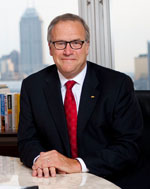 |
| Lilly CEO John Lechleiter |
Biotech's ongoing boom has inflated valuations for upstart drugmakers, and Eli Lilly ($LLY) CEO John Lechleiter said his company is wary of getting involved in any high-dollar bidding wars to bring in new treatments.
Speaking to analysts following Lilly's second-quarter earnings presentation, Lechleiter said "there's a bit of a bubble" at play in the biotech world, jacking up prices for promising assets in development by small and midsize companies. And Lilly, in need of a sales boost, is less than eager to risk overpaying for new drugs, he said.
Lechleiter's comments echo a similar sentiment from Roche ($RHHBY) CEO Severin Schwan, who told CNBC on Thursday that the company has turned down a number of deals because the market price for new therapies has simply gotten too high.
Interestingly, those rising concerns among Big Pharma aren't broadly shared among the industry's middle class. Celgene ($CELG), a sizable biotech competing with global giants, has been repeatedly willing to cut big checks for new assets, this year signing a $1 billion deal with Juno Therapeutics ($JUNO) in oncology and paying $7.2 billion for Receptos ($RCPT) and its anti-inflammatory drugs. And Alexion Pharmaceuticals ($ALXN), another Big Biotech, shelled out $8.4 billion for fellow rare disease specialist Synageva BioPharma in May.
Such big-budget bets reflect a greater appetite for risk, as, especially in Celgene's case, there are major binary events on the calendar that could make those acquisitions look either prescient or wrongheaded. And to Lechleiter's point, investors have taken a very bullish stance on such gambles; Celgene's shares are up roughly 24% on the year, while Alexion's have risen about 11%.
But Lilly, which finally delivered sales growth in Q2 after 6 consecutive quarterly slumps, may not be in a position to be choosey. The company's late-stage pipeline is full of drugs that, if approved, would compete in crowded markets, whether in diabetes, inflammation or oncology. And the drugmaker's most potentially lucrative candidate is a treatment for Alzheimer's disease, a field that bedeviled developers for decades.